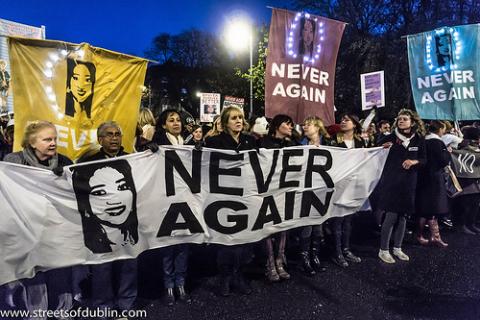Abortion debate reveals inequality of Irish laws

Our legislators are in deep denial about the significance of the constitutional framework on abortion that they want to protect. By Vincent Browne.
Nothing that the expert group on abortion has proposed on clarifying the law on when abortion is permissible here would have saved the life of Savita Halappanavar, if what we now understand were the circumstances of her death is correct.
Praveen Halappanavar has said his wife, who was pregnant, went into hospital suffering from back pain. It was soon made known to her that her baby had no chance of survival outside the womb and it seemed a miscarriage was about to take place with the opening of her cervix.
There was a prolonged delay in the miscarriage happening naturally, during which time Savita Halappanavar was in great pain and asking that the miscarriage be induced. She may have been aware of a risk of infection from the delayed miscarriage.
Her doctors declined to intervene, probably because the foetus was still alive, and even though the foetus had no chance of surviving outside the womb, but there was not, it then seemed, a risk to her life. It seems it was only after the miscarriage had taken place naturally that the risk to her life became apparent.
If this is what happened, the doctors involved in this case acted within the law and the relevant guidelines of the Medical Council, as an induced termination of pregnancy is permissible only when there is a substantial risk to the life, as distinct from the health, of the mother, and this applies even in circumstances in which the unborn baby has no chance of survival.
The expert group report did not deal with this issue because it had no bearing on the X case, but it has a great deal of bearing on the 1983 constitutional amendment.
This constitutional provision means that a woman is required by the fundamental law of the state and under pain of criminal sanction to give her body to the sustenance of an unborn child, even though doing so may cause her to be seriously disabled for the rest of her life, even though she may have become pregnant through rape and be traumatised by the thought of having within her the child of a violent rapist, even though her future health may be endangered by a foetus that has no hope of survival outside the womb.
Alan Shatter, the Minister for Justice, was right when he said in the Dáil on 27 November: "It can truly be said that the right of pregnant women to have their health protected is, under our constitutional framework, a qualified right. This is a republic in which we proclaim the equality of all our citizens, but the reality is that some of our citizens are more equal than others."
The reality also is that our legislators are in deep denial about the significance of the constitutional framework that they want to protect. They are in denial that abortion is not just simply about the killing of an innocent, vulnerable unborn human being, but the imposition on women - and obviously only on women - of the demand that they give of themselves to the sustenance of this other being, irrespective of the damage that this may cause to them. It is unthinkable that men would agree to a similar imposition.
In support of this latter claim about men, just think of a scenario whereby a man goes into hospital for a minor operation and wakes up to find himself hooked up by a tube to another person and told that, because of a unique coincidence of blood types, this other person depends on this hook-up for a period of several months; otherwise he or she will die.
Wouldn't any man be furious to be put in such a position? Wouldn't we be outraged if we were then to discover that the state had passed a law requiring us to give sustenance to this other person, irrespective of what harm or even inconvenience it caused us?
How is that scenario different from a woman who is pregnant due to rape? Why is it OK to criminalise a woman who ends this dependency, while we think it would be intolerable to require something similar of men?
There is a further outrage, albeit not at all of the same magnitude or significance.
Fine Gael in the last election solicited votes on an undertaking that, in government, it would not legislate for abortion, and Enda Kenny himself said he would not do so.
As I wrote two weeks ago, he said in an interview with me in the 2007 election campaign: "I will not introduce legislation on abortion. I am very clear on this. I do not favour legislation on abortion... "
Nothing has happened in the interim to justify his change of mind, apart from the fact that he is now Taoiseach of a coalition government and he endangers that position if he sticks to his previous commitments.
That is bad enough, but for him now to insist, via the whip system, that others, who may have had a more conscientious commitment to the undertaking not to legislate for abortion, now abrogate not just an undertaking they gave to the electorate but also their genuine consciences, is more than a bit much.
Image top: infomatique.
